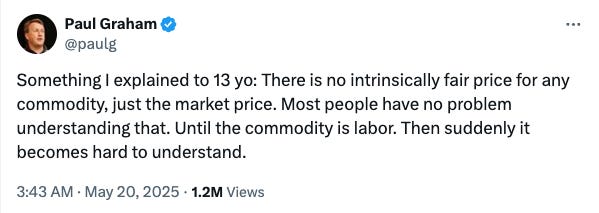015 - Relationships Scale Differently
In a world of infinite leverage, presence is the rarest advantage
As much as I love the word "progress" and everything connected to it, it has a myth embedded in it: that efficiency always wins, that the future belongs to geniuses with infinite leverage, aided by armies of machines that solve and streamline everything.
First, we automated the hands and the legs, running watches and wellness devices telling us when to speed up, slow down, hydrate, sleep. Then we automated the head, algorithms now optimize everything from training schedules to startup growth. Yet, as technology accelerates, what we once cherished as skilled human craft turns into infrastructure. But I can’t stop thinking that the more we automate, the more we notice it feels cheap, and the more obvious it becomes what’s missing.
Every time I dive into a long conversation about AI, whether on a long run with a friend, a dinner, or a zoom call, an obvious question always surfaces:
What happens when machines surpass us at manual and cognitive work?
When will we prefer an imperfect human over a perfect machine, or even an army of them?
As we sprint ahead with technology, I believe we're beginning to seriously reconsider how much we still need people, and more importantly, how we truly value them.
In this exploration, we often point to traits like curiosity, authenticity, creativity, willpower, agency, taste, and attention. Yes, these matter. But beyond traits or skills, I want to dive into the deeper roles humans uniquely play, roles that create genuine value for each other.
Let's call it Interpersonal Currency or Relational Labor.1
Interpersonal Currency is rooted in presence, context, commitment, and care. It's the kind of work that doesn't neatly appear in KPIs but clearly impacts morale, momentum, and trust. It lives vividly in roles I deeply respect: cofounders, coaches, therapists, teachers, social workers, chiefs of staff, people I've admired and worked with closely throughout my life.
It's why some people hire for companionship as much as they do for competence. It's why athletes choose coaches who resonate on a deeper level, beyond just expertise.
The job isn't just the job. It's the relationship.
Coaching and startups hold up similar mirrors, reflecting this truth back to us.
Athletes, training partners, coaches, are often underrated. There's an enticing myth in endurance sports, the solo athlete with infinite self-sufficiency, powered by data, optimized by algorithms. Similarly, there's the billion-dollar solo founder, leveraging AI to seemingly limitless ends.
Yes, you could train alone. But that quickly becomes lonely, isolating, and limiting.
Nobody dreams of celebrating alone at the finish line in Boston or not hugging someone after Mont- Blanc UTMB start line.
We crave teammates, fellow runners, coaches, people who witness and validate the struggle, push us beyond our perceived limits, catch what we overlook, and keep the mood light when things inevitably get heavy.
People often tell me how much more I can accomplish alone now, with AI. They’re right. We can write, design, launch, sell, automate endlessly. Athletes can train independently, optimize every session, automate entire routines. Apps can prescribe workouts, analyze recovery, simulate race strategies…
Yet building up without genuine human connection feels unmistakably hollow.
I'm not against a solo dinner, a solitary run through Chapultepec, or quiet moments of reflection in the mountains. But I don't want a world where presence is just another product, relationships reduced to responsive interfaces.
All this tech, and I still crave my teammates.
Technology has raised expectations, not diminished my need for authentic coaching relationships, genuine partnerships, or collaborative brainstorming.
But as intelligence becomes cheaper, presence becomes more expensive
Authentic interpersonal trust will become the rarest currency. Interpersonal Currency is how this currency gets minted. Real trust between athletes and coaches, founders, investors, advisors and entrepreneurs becomes precious and essential.
Training with the right person, coach, athlete, partner, is exponentially more impactful. We'll remember this even more acutely as technology saturates every aspect of our lives.
In coaching, startups, and life itself, people remain the ultimate competitive advantage.
Chemistry still beats code.
Marc Andreessen argues many jobs will remain safe from automation because they exist in regulated sectors like healthcare, education, and government. But I believe human-centric roles everywhere, coaching runners, mentoring early-stage founders, teaching kids, are safe precisely because they’re rooted deeply in presence, empathy, and genuine care.
We’re accustomed to paying for professional relationships but typically justify costs based on measurable output.
What happens once most "output" is automated, and markets must price relationships independently?
Will we commoditize human partnership or watch it become a luxury?
As Paul Graham points out, people accept there’s no "fair" price for a commodity until the commodity is labor2
Some interactions will inevitably get faster and more synthetic. But true presence doesn't scale easily, making genuinely human work not just rare but increasingly unequal. As teams shrink and organizations flatten, the leverage of relational roles grows.
AI might imitate that with synthetic empathy, simulated guidance, and algorithmic support but one-sided relationships quickly become → sycophantic.
With luck, our future will start resembling our past, relationships placed firmly at the core. I'm genuinely bullish on the resurgence of the right-hand man, maybe even a right-hand renaissance man.
10x is impressive, but a 1:1 connection might be more powerful.
We’ve automated the hands.
We’re automating the heads.
What's left is the heart,
Presence, commitment, and care. It’s work machines can't replicate because they can't relate to us in the truest sense.
Life is undeniably better with good company. And companies, performance teams, communities, homes, all are infinitely better when filled with authentic human life.
It's not about how many people, but about how deeply human.
In a world of infinite machines and infinite outputs, the most irreplaceable work won't be done by those who replace us but by those who choose to do it alongside us.
Thank you for reading,
Luis.
I’m a longtime fan of Sociologist Arlie Hochschild’s thesis on “emotional labor.” I consider relational labor to be a broader umbrella under which emotional labor exists.
It is hard to really grasp ‘pricing’ relational labor in a market. We’ve always looked for other ways to triangulate to this value, relying heavily on the manual and cognitive labor bundled with it. With the unbundling of these two from humans, we’re a bit lost.




Me encantó tu pensamiento, algunos emprendedores-atletas olvidan el proceso, la conexión, el viaje. In a nutshell: “10x is impressive, but a 1:1 connection might be more powerful.” IS for sure more powerful. Gracias x compartir 🤙🔥
No amount of intelligence will ever beat being alongside a human or group of humans whose actions will derive from feelings or a certain consciousness level.